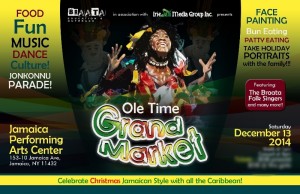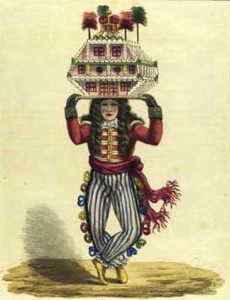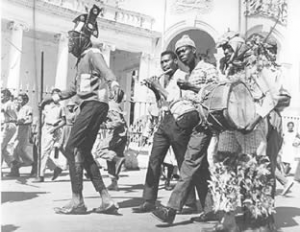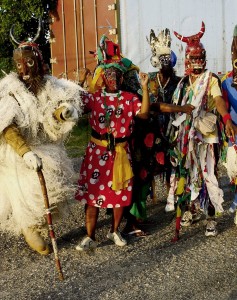
Why is Mr. John Canoe Disappearing Down the Road?
December 30th, 2014
So, what did Christmas mean to Jamaicans this year?
The few days preceding Christmas, in Kingston at least, were frenetic. Traffic swelled to gridlock levels, supermarkets were under siege and nerves were frayed as shoppers with limited budgets struggled to find the best bargains. Desperate women fought over Christmas cake in a well-known supermarket. There were lots of treats for children and the elderly; we need more attention for our vulnerable citizens year-round, it seems to me. Local firms bombarded us with special “deals” on mobile phones and gadgets. There seemed to be more browsers than big spenders at the shopping plazas and the craft fairs. Downtown vendors complained of slow sales (up to Christmas Eve, when there was the usual last-minute rush). People dressed up and went to parties – the flashy kind you pay for, or private ones. There were fewer Christmas lights bedecking our street. The annual dancehall fiesta “Sting” degenerated into pointless violence at six in the morning. Some said the scuffles, punch-ups and general hostility were in the “dancehall tradition” and expected.
Oh, I mentioned tradition. Well, now. If you ask Jamaicans what they enjoyed about their Christmas, they do not mention the shops, gadgets or even parties. People always say it was good to spend time at home, sharing Christmas dinner with family and friends, going to church perhaps. Others will just say it was “quiet” – which sounds like “boring.” What does this tell us about the way in which we would perhaps prefer to celebrate?
Every year the local media ask this well-worn question: “Have we forgotten the true meaning of Christmas?” Apart from the obvious religious connotations of the question, what really has been lost? We get the feeling, don’t we, that something is missing these days. We have lost some kind of emotional satisfaction, a connection to who we are as a people and a society – a link back to who we once were, who our parents and grandparents were. Christmas is supposed to be special in some way – and it really isn’t. Just a bit more of the same.
Yes, there is plenty of focus on the food. That has not changed. We relish the ham, the sorrel (alcoholic or otherwise), the gungo peas. We eat (and perhaps drink) too much. The weather is usually sweet, the light softer, the “Christmas breeze” blows. We play some Christmas music, watch Christmas films on television. All guaranteed to make you feel a little better about life – if the relatives you only see once a year aren’t proving too annoying.

A “staged” effort to revive Jamaican Christmas traditions. But it needs to be out there on the street to create the real community atmosphere.
But outside the home, where can we find traditional Christmas activities? Many older Jamaicans reminisce about Grand Market. This originated in slavery days, when Christmas was the main holiday, taking place on Christmas Day or the market day immediately preceding it. Many items available on this day were unique to the season – small trinkets, bright hats, toys, sweets. It was also a time to dress up and socialize. Is there any reason why this could not still be seen as an economic opportunity – something special – by vendors and micro-entrepreneurs, in Kingston and in market towns across the island? Perhaps a special Christmas Eve market? I wonder how many Grand Markets – on whatever scale – actually took place this year.
I also have a memory, from the 1980s. We were driving down the main north coast road one Christmas when we noticed a flutter of movement, a splash of color up ahead by the side of the road. As we drew closer we could hear a thin piping, rattling sound – the fife and drums. It was a Jonkonnu band. The rhythm was hypnotic. The masked dancers kicked out their legs, stamped their feet, shook their heads, worked their elbows out and up and down in a manner that reminded one of some dancehall steps. A small crowd of residents surrounded them, mostly women and children who fluttered nervously on the outskirts of the group – at once fascinated and fearful.
The origins of Jonkonnu (the British called it John Canoe) are obscure, but according to Olive Senior’s “A-Z of Jamaican Heritage” (an essential book for your shelves, by the way) the name may originate in the Ewe language of Eastern Ghana and Togo, with the meaning “sorcerer man.” Some scholars believe it has its origins in West African secret societies (the performers are always men and they do not identify themselves – they don’t speak, only make occasional guttural sounds). The slight eeriness of the dance and music persists to this day; Jonkonnu, if done well, must give you a little shiver. In the early days (eighteenth century) Jonkonnu bands were much larger and although it was initially encouraged by the slave masters, who introduced European and Creole characters such as the Set Girls and elements of English folk dancing. Later (post-Emancipation) it was seen as altogether too subversive and efforts were made to suppress it. Did you know there were “John Canoe Riots” in 1841, when the Mayor of Kingston banned the parade? Other characters might include Horse Head and Cow Head; the Devil (who sometimes runs at children with his pitchfork, sending them screaming away); the Belly Woman, who is less sinister, bouncing her pregnant belly up and down in time to the music); Policeman, who strides along keeping people in order; the energetic Pitchy-Patchy, whose costume consists of layered scraps of colorful cloth and who sometimes cracks a whip; Wild Indian; Bride; and there is a King and Queen, too, as well as sometimes a man with a great house on his head.
There is surely still a space for Jonkonnu in our lives, at Christmas time. I don’t mean a stage performance space or a hotel full of tourists – although this would certainly interest visitors; I am thinking of the random space that is the street, the town square, that public space where fun can be created. The Jonkonnu parade must be spontaneous; the performers interact with each other, run at their audience, scatter the little children, put on a special show for a woman holding her baby. Jonkonnu is life, the life of our ancestors. It’s not a show, a fossilized relic of “yesteryear.”

The Jamaican Jewish artist Isaac Mendes Belisario (1795-1849) produced a series of prints of Jonkonnu characters. This one is Jaw-Bone or House John-Canoe (1837-1838). Image: National Gallery of Jamaica
So, dare I say we would rather embrace Mariah Carey’s Christmas album than the sights and sounds of our African ancestors? I know that with cultural expressions it is often a question of “to each his own,” and I may be one of the few whose teeth are set on edge by Mariah’s high notes.
But it is sad to see Mr. John Canoe retreating into the distance. Can we bring him back again?
Tags: Christmas, dancehall, Grand Market, Jamaica, John Canoe, Jonkonnu, Kingston, Sting
The Gleaner reserves the right not to publish comments that may be deemed libelous, derogatory or indecent.
To respond to The Gleaner please use the feedback form.
- We Are the Zoomers
- Living Online with Humans and Birds: NAOC 2020
- Human Trafficking and the Problem of Public Education
- Down Memory Lane
- Are We Ready to Recover from COVID-19?
- Road Safety Matters: Is Your Vehicle Safe?
- Sexual Harassment, Me Too, and the Minister’s Disturbing Giggle
- The Vulnerable Senior Citizens, Private Care Homes and COVID-19
- A Muddle Over Masks
- Here is Something Life-Saving You Can Do: Give Blood!




